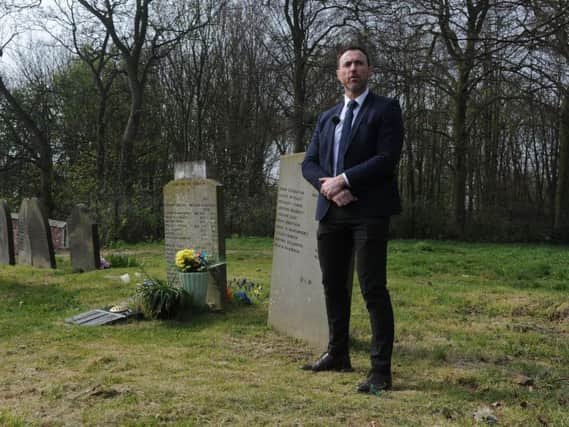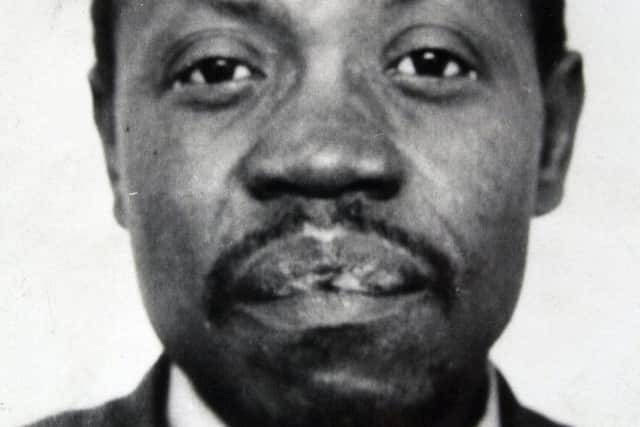Son of whistleblowing police cadet speaks movingly at David Oluwale memorial event in Leeds


Carl Galvin's dad, Gary Galvin, was the police cadet who blew the whistle on two fellow officers who hounded David - a homeless and mentally ill man originally from Nigeria - during the final months of his life back in 1969.
Gary's determination to do the right thing - and risk a backlash from his colleagues and wider society - led to Insp Geoffrey Ellerker and Sgt Kenneth Kitching being charged with manslaughter, perjury and grievous bodily harm.


Advertisement
Hide AdAdvertisement
Hide AdThey were cleared of those charges in 1971 but convicted of assaulting David, with Ellerker being jailed for three years and Kitching for 27 months.
Carl, like his father before him, is a police officer who today holds the rank of detective superintendent with the West Yorkshire force.
He was among the speakers at an emotion-charged event held on Thursday at the side of David's grave in Killingbeck Cemetery.
The event, which also featured songs and was led by David Oluwale Memorial Association chair and former Leeds West MP John Battle, took place 50 years to the day since David was last seen alive.
Advertisement
Hide AdAdvertisement
Hide AdAnd today the Yorkshire Evening Post publishes in full Carl's compelling words to the people who gathered to remember a man who came to England from his homeland in search of a better life but instead fell victim to bigotry and violence.
Speaking without notes and from the heart, he told them: "What an unbelievably poignant moment this is, some fantastic speakers and the performers are absolutely wonderful, so I stand in front of you with a lot of nerves.
"I just want to spend a couple of minutes, if I may, building on something that John [Battle] has said.
"John spoke about remembering David, not just the person, but also those whole circumstances and our city and the effect it had on my father and on our organisation which I'd just like to touch on.
Advertisement
Hide AdAdvertisement
Hide Ad"Unfortunately my father is not with us any longer, he passed away in 2002 after completing a 30-year police career and, looking forward to his retirement, he sadly passed away with cancer two weeks after his 50th birthday.
"I have had the absolute privilege and honour to be involved with the David Oluwale Memorial Association for a number of years now and I'm able to keep his memory alive.
"The events of 1969 had a profound effect on my father, a man who up until that point had been a team player with a wide circle of friends and involved in a lot of team sporting activities.
"As a result of some of the reaction he got from colleagues and other people within society at that time, he became quite a solitary individual, but with that came a lot of strength because he would never ever let his morals and ethics waver and that is something he instilled in me and my brother as we were youngsters growing older.
Advertisement
Hide AdAdvertisement
Hide Ad"He told me about this story in the last few months of his life, he was poorly in a hospice and he revealed to me a scrapbook that some of you may well have seen down at [a David Oluwale exhibition currently running at] the Tetley gallery.
"He revealed that scrapbook to me of the memories he had kept and within it were lots of newspaper articles but also, and the thing that I picked out more, there were letters from all over the world praising him for his courage.
"If you imagine in 1969 how difficult it must have been to try and track him and find somebody, he didn't have an Instagram account, he had no Facebook ID, there was no e-mail, so some people literally wrote Gary Galvin West Yorkshire and posted their letter from as far away as Canada, Africa and many parts of the UK.
"Yes, there were people within the police that hounded David, we can't get away from that.
Advertisement
Hide AdAdvertisement
Hide Ad"There were also people within the police who realised how bad that was and actually were pivotal in bringing [Kitching and Ellerker] to justice.
"That's the reason why I joined West Yorkshire Police, I joined West Yorkshire Police because, let me tell you, working with the 9,000 staff we have every single day, there are far more Gary Galvins in West Yorkshire Police than there are Kitchings and Ellerkers.
"It's really great that we can come together and commemorate David's life but what you also give me is strength to help me and my family to remember my father."
David was found dead in the River Aire at Knostrop Cut, near the city centre, on May 4, 1969.
Advertisement
Hide AdAdvertisement
Hide AdThe 38-year-old had last been seen on April 18 being chased by the police towards the river.
Thursday's graveside event formed part of a cultural and memorial programme being held in Leeds to mark the 50th anniversary of David's death.
For further information, visit the www.rememberoluwale.org website.